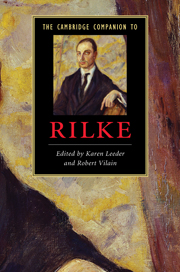3 - Early poems
from PART II - WORKS
Published online by Cambridge University Press: 28 July 2010
Summary
'I can imagine no knowledge more blessed than this: that one must become a beginner.' The question of how to begin preoccupied Rilke throughout his writing life. A beginner was never something he just was, he had to become it: 'recover the initial innocence, come back to the place of naivety', he wrote in 1920. It is probably true to say that Rilke began as a poet too easily, and that as he became a better poet he found it harder and harder to begin. At the same time he understood his work itself as a process of becoming and self-realisation. In Paris in 1902, confronted with the hostile diversity of the city and the immense focus of Rodin, he realised he would have to start all over again. He did, but could never have done it without the many beginnings he had already made, which even at that point, and much more so if we include everything written before the first volume of New Poems in 1907, make up a body of work that can only be bracketed off as 'early' because of the importance of what followed.
Rilke's earliest verse, from Lives and Songs (1894) to To Celebrate Myself (1899), is not much read, and has suffered not just from the great shadow thrown by the later works but simply from there being so much of it. Though many contemporaries had trouble freeing themselves from the fin de siècle inheritance, it is hard to find another poet who not only wrote but published so prolifically before producing major work.
- Type
- Chapter
- Information
- The Cambridge Companion to Rilke , pp. 41 - 58Publisher: Cambridge University PressPrint publication year: 2010

